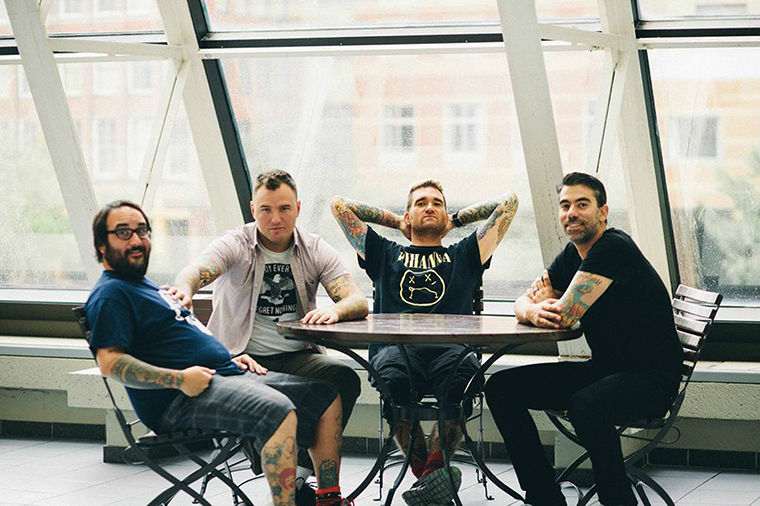‘My Friends Over You’ singer defines pop-punk genre
California-based pop-punk band New Found Glory has made its mark on its fans, over a 17-year career, culminating in the Oct. 7 release of its eighth studio album Resurrection.
November 3, 2014
New Found Glory, a pop-punk band from Coral Springs, Florida, has made its mark on the genre.
After the release of its hit song “My Friends Over You” in 2002 and parting with longtime guitarist Steve Klein, the group, which is now composed of singer Jordan Pundik, guitarist Chad Gilbert, bassist Ian Grushka and drummer Cyrus Bolooki released its eighth studio album, Resurrection, on Oct. 7 through Hopeless Records. The response has been the best the band has received yet, with fans requesting the songs at shows.
Together for 17 years, New Found Glory has become known for defining the pop-punk genre along with bands such as Blink 182. The Florida four-piece has influenced many other groups in the genre with pounding drums and catchy harmonies.
The Chronicle spoke with Pundik about the band’s latest album, trend setting and the maturation of the band’s sound through the years.
THE CHRONICLE: Why did you name the new album Resurrection?
JORDAN PUNDIK: [With] everything we were going through in the past year, it was kind of like looking at the s—-y situations that we were going through and kind of coming out of them a better band. A lot of people say, “Oh Resurrection—did you guys die and come back?” No, we were always around. It’s just getting through those [tough] times and coming out a lot stronger than before.
How did the recording process differ between Resurrection and your earlier albums?
JP: It was the first time we had all the songs done before we went into the studio. How that came about was I was going up to [Gilbert’s] house—I live in San Diego and he’s up in L.A.—so I would drive up to his house once a week and we would just sit at his table and talk about the direction and what we wanted to talk about. [Bolooki] would come up, too, and we’d record crappy demos; then before we went to record, we got a rehearsal place for a week and ran through the songs with everybody. When we went [into the studio], we had everything pretty much ready to go. [Producer] Neal Avron came to our rehearsal space to hang out and listen to [the new] songs. He helped with some of our other records, and we knew we were going into this record self-producing it. He came in just to give us some notes and said he didn’t have any notes for us, so that was a really good ego booster.
How would you describe the sound of the new record?
JP: It’s got a lot of bite to it. I want to say it’s the most positive record as far as how people can relate to it. But there’s also a lot of mean songs on there, but mean in a way that you’re dealing with those things and you’re coming out of those tough situations better.
Your fans have stayed young because of the crowd that favors pop-punk. Is your aim to keep your audience young?
JP: Yeah! I don’t know if it’s a conscious aim. It’s just kind of naturally happening that way, which is really cool. It’s not just a bunch of old dudes drinking beer in the back saying, “Play ‘My Friends Over You.’” Everyone’s getting into all of the songs and people that grew up listening to us are now our age and they’ve introduced their younger friends or siblings to the band. I’m pretty active online and I go on Twitter and people will message me and say, “I’ve never listened to you guys. [Resurrection] is the first record [I’ve heard by you] and it’s awesome.” It’s really cool.
How do you think your music has changed through the years?
JP: We’ve always been a band that writes about the human experience. I feel like we’ve grown theme-wise, and musically we always try to make [the next album] better than the last one. People say our band has defined a genre, which is a flattering thing. I never think of it that way. There are so many people in bands and fans that come up to us and tell us that we get better with age. There’s people that hate and say, “Oh, they should have stayed in the direction of Coming Home,” but I don’t care. I want to have fun on tour and on stage. I want to have fans that are going to have fun when they come see us play. The main focus is to write fun, upbeat songs that people can relate to. We want to keep doing what we do and what people know us and love us for. We didn’t want to abandon anyone on the way.








